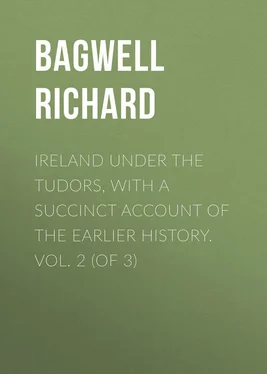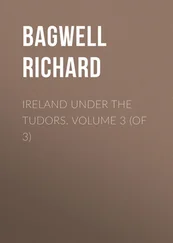Richard Bagwell - Ireland under the Tudors, with a Succinct Account of the Earlier History. Vol. 2 (of 3)
Здесь есть возможность читать онлайн «Richard Bagwell - Ireland under the Tudors, with a Succinct Account of the Earlier History. Vol. 2 (of 3)» — ознакомительный отрывок электронной книги совершенно бесплатно, а после прочтения отрывка купить полную версию. В некоторых случаях можно слушать аудио, скачать через торрент в формате fb2 и присутствует краткое содержание. Жанр: foreign_antique, foreign_prose, Историческая проза, на английском языке. Описание произведения, (предисловие) а так же отзывы посетителей доступны на портале библиотеки ЛибКат.
- Название:Ireland under the Tudors, with a Succinct Account of the Earlier History. Vol. 2 (of 3)
- Автор:
- Жанр:
- Год:неизвестен
- ISBN:нет данных
- Рейтинг книги:4 / 5. Голосов: 1
-
Избранное:Добавить в избранное
- Отзывы:
-
Ваша оценка:
- 80
- 1
- 2
- 3
- 4
- 5
Ireland under the Tudors, with a Succinct Account of the Earlier History. Vol. 2 (of 3): краткое содержание, описание и аннотация
Предлагаем к чтению аннотацию, описание, краткое содержание или предисловие (зависит от того, что написал сам автор книги «Ireland under the Tudors, with a Succinct Account of the Earlier History. Vol. 2 (of 3)»). Если вы не нашли необходимую информацию о книге — напишите в комментариях, мы постараемся отыскать её.
Ireland under the Tudors, with a Succinct Account of the Earlier History. Vol. 2 (of 3) — читать онлайн ознакомительный отрывок
Ниже представлен текст книги, разбитый по страницам. Система сохранения места последней прочитанной страницы, позволяет с удобством читать онлайн бесплатно книгу «Ireland under the Tudors, with a Succinct Account of the Earlier History. Vol. 2 (of 3)», без необходимости каждый раз заново искать на чём Вы остановились. Поставьте закладку, и сможете в любой момент перейти на страницу, на которой закончили чтение.
Интервал:
Закладка:
When all was ready the army encamped near Armagh, which it was proposed to make a store-house for plunder. Five hundred cows and many horses were taken in a raid northwards; but the Blackwater was flooded, and nothing more could be done for several days. Not to be quite idle, Sussex sent Ormonde to Shane, who offered worthless hostages for his prompt departure to England, but refused to give up O’Donnell. An attempt was then made against some cattle which were discovered on the borders of Macmahon’s country. In compliance with a recognised Irish custom, Macmahon was probably obliged to support a certain number of his powerful neighbour’s stock. Sir George Stanley, with Fitzwilliam and Wingfield, went on this service with 200 horse, seven companies and a half of English foot, 200 gallowglasses, 100 Scots, and all the kerne in camp. Ormonde was ill, and Sussex in an evil hour, as he himself says, stayed to keep him company. The cattle were driven off, and no enemy appeared. On their return Shane overtook the troops with twelve horse, 300 Scots, and 200 gallowglasses. Wingfield, who commanded the rear guard of infantry, allowed himself to be surprised, and for a time all was confusion. The column was long, and some time passed before Stanley and Fitzwilliam knew what had happened. They at once attacked the Irish in flank, and Shane in turn suffered some loss; indeed, the annalists say, with a fine rhetorical vagueness, that countless numbers were slain on both sides. But the cattle, the original cause of the expedition, were not brought into Armagh. The moral effect of the check was disastrous, and Sussex, though he put the best face on the matter when writing to Elizabeth, exaggerating Shane’s losses and making light of his own, did not conceal the truth from Cecil. ‘By the cowardice of some,’ he wrote, ‘all were like to have been lost, and by the worthiness of two men all was restored.’ Wingfield was chiefly blamed, but the Lord-Lieutenant bitterly reproached himself for remaining behind when so large a force was in the field. Fifty of his best men were killed and fifty wounded, and it was impossible to take that prompt revenge which alone can restore the reputation of an army when defeated in a hostile country by a barbarian enemy. ‘This last July,’ said the unhappy Viceroy, ‘having spent our victuals at Armagh, we do return to the Newry to conduct a new mass of victuals to Armagh.’ 28 28 Lord-Lieutenant and Council to the Queen, July 31, the official account for Elizabeth’s eye. The fuller and truer account is in a letter of the same date from Sussex to Cecil. Four Masters , 1561.
When Cecil heard the evil tidings he says himself that he was so appalled that he had much ado to hide his grief, the rather that Lord Pembroke being away there was no one with whom he could share it. To the Queen he spoke as lightly as he could of a little bickering in which Shane had the greater loss, which to the letter was true. For the benefit of the general public Cecil gave out that Shane had been overthrown with the loss of two or three captains. Privately he urged Sussex to use strong measures with those who had shown cowardice. But it was seldom possible to hide the truth from Elizabeth, and she soon knew all. She gave orders that Wingfield should be deprived of all his offices, and dismissed her service with ignominy. But the wrath of Sussex soon cooled, or perhaps his conscience made him generous. It was discovered that Wingfield’s patent as Master of the Ordnance could not be voided, because he had acted only as a simple captain. His services among the O’Byrnes were remembered, and both Sussex and Ormonde interceded for him. At his own urgent request he was summoned to Court, when he probably succeeded in rebutting the charge of actual cowardice, and he remained Master of the Ordnance till his death in 1587. 29 29 Instructions to Sussex in Carew , July 4, 1562. Sussex to Cecil, Aug. 23, 1562, and Jan. 11, 1563; to the Queen, Aug. 23, 1562; Ormonde to Cecil, Jan. 11, 1563. Sussex was much blamed for not punishing Wingfield himself, but in the end his view prevailed, for the disgraced officer carried confidential instructions on his return to Ireland. See the Queen to the Lord-Lieutenant, July 19, 1563. See also two letters from Cecil in Wright’s Queen Elizabeth , Aug. 21 and Dec. 18, 1561.
Having driven the English out of his country, Shane O’Neill proposed to treat with Ormonde, no doubt with the deliberate intention of insulting Sussex. To Ormonde accordingly he sent his messenger, Neal Gray, with power to make terms. Shane was ready to go to the Queen, and to repair the church at Armagh. But he would not make peace while the soldiers remained there, and he declared that no one in his senses would believe in the peace while such a sign of war remained. To show his own idea of peace and friendship he asked Sussex to be his gossip, and to give him his sister’s hand. The Lord-Lieutenant declined to withdraw the garrison until the Queen’s pleasure should be known. Fitzwilliam had gone to her, and Ormonde, knowing that nothing would be done till his return, had gone home. If Shane hurt any of his neighbours in the meantime, he was warned that he could never hope to see the Queen’s face. Sussex marvelled at the constant changes in Shane’s answers. ‘O’Neill desired me to procure the Queen’s pardon and protection, for the which at his request we have already sent Mr. Treasurer, and now he desireth to send his own messengers, whereby it seemeth he should seek delays, for that his messengers cannot go and return with such speed as Mr. Treasurer will do. And we know not to what other purpose he should send his messenger thither. Therefore we will him to send us word by writing directly whether he will go to the Queen’s Majesty, according his oath taken, if Mr. Treasurer bring him the Queen’s pardon and protection.’ To this Shane haughtily answered that he would make no peace with any of his vassals (urraghs) but at his own time and in his own way, and that he would receive neither pardon nor protection from the Queen unless they were delivered to his own messenger. In his natural anger at such an answer, Sussex called loudly for strong measures: ‘if Shane be overthrown, all is settled; if Shane settle, all is overthrown.’ It was no fault of his that the arch-rebel would not go to the Queen. Indeed, it was well known that Kildare had first advised that step to gain time, and then prevented its being taken for the same reason. 30 30 Shane O’Neill to the Lord-Lieutenant, Aug. 9, ‘from his woods:’ – ‘Pacem tractare non queo modo solidarii manebunt in aliquâ parte terrarum mearum, nam nemo sanæ mentis intelligat tranquillam pacem esse inter me et amplitudinem vestram si dicti solidarii manebunt in patriâ meâ.’ The ‘Urraghs’ whom Shane claimed as vassals were in fact all the chiefs of Ulster except O’Donnell. The word is given in O’Reilly’s Dictionary as ‘a chief next to a king;’ as used by Shane O’Neill, it means any chieftain over whom he claimed jurisdiction. Memorial for an answer to Shane’s letters, Aug. 12.
Fitzwilliam was instructed to ask for an immediate aid of 200 men, and 3,000 l. The men were ordered from Berwick, and 2,000 l. of the money was sent. Transports were pressed upon the Lancashire coast, and the Queen wrote in her best style to encourage Sussex. His ill success, she was sure, had come from no want of goodwill, and the chances of war were to be borne patiently; but she marvelled that the General had not punished those who showed cowardice. Traitors and cowards were to be sent to gaol without favour or affection. The Queen impressed the value of patience upon Sussex, her own principle being rather to recover the subject by persuasion than force. She was willing to give Ormonde a reasonable sum for Shane’s expenses, leaving the question of security to Sussex. She would not withdraw the garrison, but would undertake that it should molest no one except notorious traitors proclaimed before last March. In the meantime Sussex was to prepare for war by discharging unserviceable men, and by withholding the pay of runaways. The Lord-Lieutenant was required to forget his private dislike to Kildare, and to work with him loyally for the good of the service. 31 31 The Queen to Sussex, Aug. 20.
Интервал:
Закладка:
Похожие книги на «Ireland under the Tudors, with a Succinct Account of the Earlier History. Vol. 2 (of 3)»
Представляем Вашему вниманию похожие книги на «Ireland under the Tudors, with a Succinct Account of the Earlier History. Vol. 2 (of 3)» списком для выбора. Мы отобрали схожую по названию и смыслу литературу в надежде предоставить читателям больше вариантов отыскать новые, интересные, ещё непрочитанные произведения.
Обсуждение, отзывы о книге «Ireland under the Tudors, with a Succinct Account of the Earlier History. Vol. 2 (of 3)» и просто собственные мнения читателей. Оставьте ваши комментарии, напишите, что Вы думаете о произведении, его смысле или главных героях. Укажите что конкретно понравилось, а что нет, и почему Вы так считаете.












